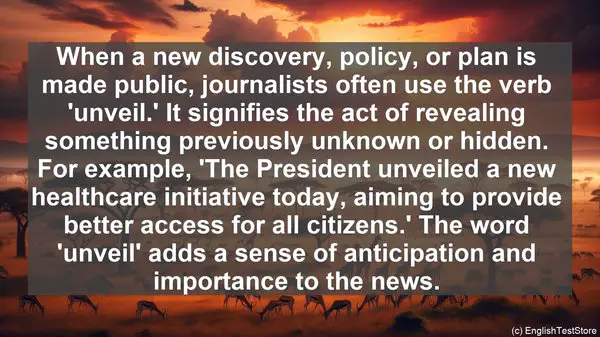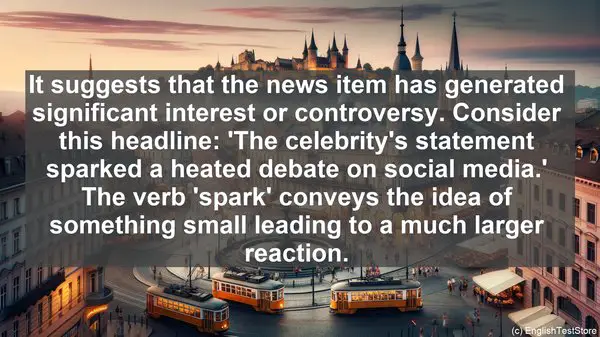Introduction: The Power of Verbs in News Reporting
Welcome to our channel. Today, we’re diving into the world of news reporting, specifically focusing on the verbs that make news stories come alive. Verbs are the action words that give momentum and impact to a news report. They can evoke emotions, create vivid images, and convey the urgency of an event. So, let’s get started with our top 10 verbs!
1. Unveil: Revealing the Unknown
When a new discovery, policy, or plan is made public, journalists often use the verb ‘unveil.’ It signifies the act of revealing something previously unknown or hidden. For example, ‘The President unveiled a new healthcare initiative today, aiming to provide better access for all citizens.’ The word ‘unveil’ adds a sense of anticipation and importance to the news.
2. Emerge: A Story in the Making
News is ever-evolving, and the verb ’emerge’ captures this dynamic nature. It’s used when a situation, event, or trend starts to become known or prominent. For instance, ‘Reports are emerging of a possible breakthrough in cancer research.’ ‘Emerge’ implies that the story is still unfolding, keeping the audience engaged.
3. Spark: Igniting Conversations
Certain news stories have the power to ignite discussions and debates. The verb ‘spark’ is perfect for such situations. It suggests that the news item has generated significant interest or controversy. Consider this headline: ‘The celebrity’s statement sparked a heated debate on social media.’ The verb ‘spark’ conveys the idea of something small leading to a much larger reaction.
4. Plunge: A Sudden Change
When there’s a sudden, often negative, shift in a situation, ‘plunge’ is a verb that captures the intensity. It’s commonly used in financial or economic news. For example, ‘Stock markets plunged after the announcement of new tariffs.’ The word ‘plunge’ paints a picture of a rapid and significant drop, emphasizing the impact of the event.

5. Garner: Collecting Support or Attention
In news reporting, it’s essential to convey the level of support or attention a person, idea, or event has received. The verb ‘garner’ does this effectively. For instance, ‘The petition has garnered over a million signatures in just two days.’ ‘Garner’ indicates the act of collecting or accumulating, highlighting the growing support or interest.
6. Denounce: Condemning an Action
When a public figure or organization strongly criticizes or condemns an action, the verb ‘denounce’ is frequently used. It signifies a formal or public rejection. For example, ‘The opposition party denounced the government’s decision as unconstitutional.’ ‘Denounce’ carries a weight of disapproval, making it a powerful verb in news reporting.
7. Rally: Coming Together for a Cause
Whether it’s a protest, a support gathering, or a community event, the verb ‘rally’ is often employed. It suggests people coming together for a common purpose. For instance, ‘Hundreds of activists rallied outside the courthouse, demanding justice.’ ‘Rally’ conveys a sense of unity and collective action, making it an impactful verb.
8. Resurface: The Return of a Topic
In news, certain topics or issues resurface after a period of relative quiet. The verb ‘resurface’ is used to describe this return. For example, ‘The debate on climate change has resurfaced ahead of the international summit.’ ‘Resurface’ implies that the topic is not new but is gaining renewed attention.
9. Tout: Promoting or Praising
When someone is actively promoting or praising a person, product, or idea, the verb ‘tout’ is often used. It suggests a strong endorsement. For instance, ‘The company’s CEO touted the new product as a game-changer.’ ‘Tout’ conveys a sense of enthusiasm and confidence, making it an effective verb in marketing or promotional news.
10. Conclude: Bringing a Story to an End
Every news story has a conclusion, and the verb ‘conclude’ is the perfect choice to indicate this. For example, ‘The investigation concluded with no charges filed.’ ‘Conclude’ signifies the end of a process or event, providing a sense of closure to the news report.

